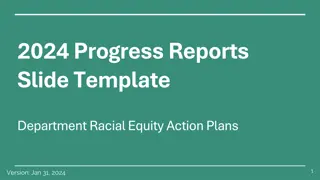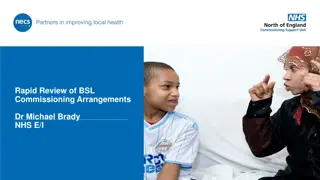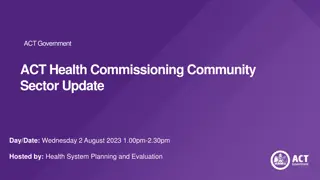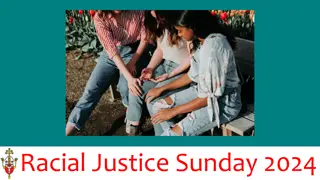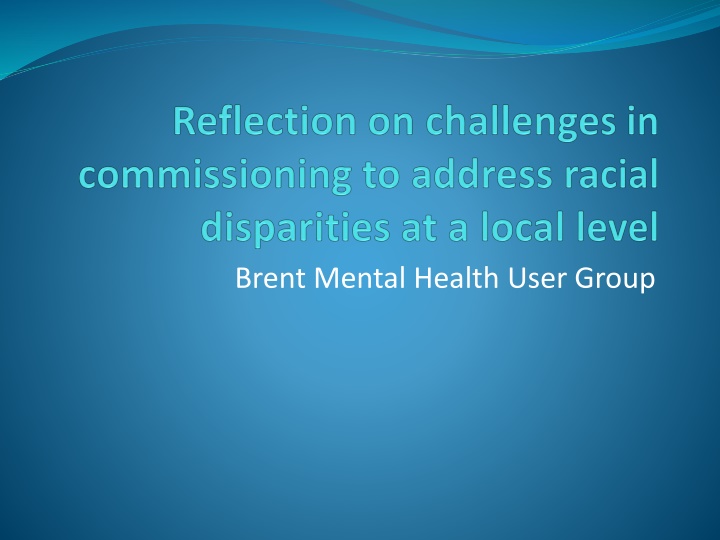
Addressing Experiences of Black and Minority Ethnic Communities in Mental Health Services
Explore the challenges faced by black and minority ethnic communities in accessing and receiving culturally appropriate mental health services. Issues such as stigma, lack of trust, and inadequate support are discussed, highlighting the need for more inclusive and responsive care strategies.
Download Presentation

Please find below an Image/Link to download the presentation.
The content on the website is provided AS IS for your information and personal use only. It may not be sold, licensed, or shared on other websites without obtaining consent from the author. If you encounter any issues during the download, it is possible that the publisher has removed the file from their server.
You are allowed to download the files provided on this website for personal or commercial use, subject to the condition that they are used lawfully. All files are the property of their respective owners.
The content on the website is provided AS IS for your information and personal use only. It may not be sold, licensed, or shared on other websites without obtaining consent from the author.
E N D
Presentation Transcript
Addressing experiences of black and minority ethnic communities using services to deal with mental health issues High percentage of African Caribbean men subject to the Mental Health Act - and in secure settings Continuing stigma and discrimination resulting in lack of trust in services so less likely to access services at an early stage More likely to be given particular diagnoses which have a long-term effect on their lives, including social exclusion Focus on medication as the solution to mental health issues so lack of use of recovery approach Experiences linked to social determinants of health not addressed
Addressing experiences of black and minority ethnic communities using services to deal with mental health issues Continued use of the medical model which often does not resonate with individuals Lack of access to more creative approaches such as self- directed support to meet social care needs Therapeutic approaches which are not culturally appropriate Use of systems that exclude those whose first language is not english and lack of interpreting Effects of lack of attention to other aspects of individuals identities eg gender, sexuality, physical and or learning disability, age...
Challenges Lack of use of wealth of data gathered locally eg about populations in Joint Strategic Needs Analysis Lack of use of wealth of knowledge about the experiences of local black and minority ethnic communities held by community organisations and user and carer groups Lack of funding available to user, carer and community groups to engage with individuals and local communities Focus of commissioners on service provision in the voluntary sector and not acknowledging our role in representing our communities
Challenges Lack of engagement with community organisations by statutory specialist mental health services in relation to service provision Individuals not consistently involved in co-production of design, redesign and evaluation of services Key performance indicators negotiated in contracts focusing on quantitative data Effects of monitoring being carried out by contracts rather than commissioning Lack of strategic involvement of individuals using services locally
Challenges Lack of organisational memory and consistent approach to engagement and good practice evidenced by grey research produced by user and community groups Lack of learning from and acting on individuals experience and what has been experienced as positive and helpful Over-reliance of statutory specialist mental health services and commissioners on information purely from Friends and Family Test and national surveys to indicate satisfaction as don t incorporate ideas for improvement
Opportunities Involve individuals from diverse communities and user, carer and community organisations in co-production in relation to the NHS Long-Term Plan to create appropriate models of care that directly address negative experiences of services ensuring time and resources Ensure that user, carer and community groups are funded and their different roles are acknowledged and acted on Ensure that information and recommendations from grey research is valued, incorporated in thinking about models of service provision and acted on
Opportunities Learn from approaches that have been successful and embed rather than replace them giving them a profile and sharing knowledge across CCGs Ensure that key performance indicators incorporate qualitative evaluation and information Ensure that statutory service providers are incorporating meaningful qualitative information and utilise existing structures eg creating dashboards to measure attention to provision that is culturally appropriate and directly addresses racial disparity and other equalities
Opportunities Create structures that facilitate strategic involvement of individuals from diverse communities and organisations that represent their experiences Ensure organisational memory as opposed to successful approaches being dependent on particular staff members continue to find ways of incorporating what has been successful
Produced by Fiona Hill Brent Mental Health User Group fionahill1@icloud.com 07986 376522

